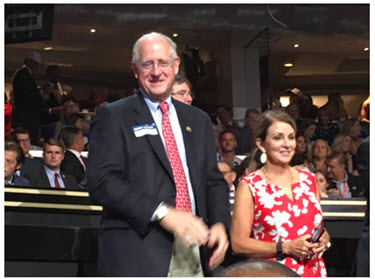WASHINGTON, July 22, 2016 - Donald Trump launched his general election campaign last night by declaring that he’ll be the voice for economically struggling Americans, and he promised that trade policy will be a “signature” issue for him all the way to Election Day.
In an acceptance speech that went on for well over an hour, Trump promised what he called a “new, fair trade policy” and said that under his administration “Americanism, not globalism, will be our credo.”
Trump didn’t offer any new details on how he would improve U.S. trade agreements. What was notable was the extended attention he gave to the issue. He laid out a list of failings by Hillary Clinton, and her husband before her, that included support for China’s entrance into the WTO, the North American Free Trade Agreement, which Trump said was “one of the worst economic deals ever made,” and the “job-killing” trade agreement with South Korea.
Trump promised to renegotiate NAFTA and repeated his promise not to sign multilateral trade agreements. He said that the Trans-Pacific Partnership would “not only destroy our manufacturing, but it will make America subject to the rulings of foreign governments, and it’s not going to happen.”
'Considerate and compassionate" on the undocumented. Trump also reiterated his promise to crack down on illegal immigration but he made no mention of his previous threat to deport those in the country. He said that he would be “considerate and compassionate to everyone.” Trump said that Clinton, by contrast, would bring “mass amnesty, mass immigration, and mass lawlessness.” Clinton has promised not to deport any illegal immigrants who aren’t criminals or terrorists.
Trump also promised to reduce overregulation “very, very
quickly,” but he didn’t mention any specific rules.
Many critics panned the speech as dark and frightening. But Trump campaign
chairman Paul Manafort said on CNN that it "wasn't dark. It was
reality."
Trump farm team leaders defend trade attacks. Former Nebraska Gov. Dave Heineman, who is assisting with the Trump campaign’s outreach to agribusiness, and Charles W. Herbster, who is chairman of Trump’s newly forming ag advisory council, sat down for an interview with Agri-Pulseyesterday near the convention site and talked about the nominee’s agriculture and trade policy.
Heineman says agribusiness leaders need to understand that Trump wants to make sure that trade deals are fair for all sectors of the economy, not just for farmers. “Talk to governors of large industrial states and they will tell you that while ag was favored in trade relations in these trade deals, the manufacturing sector and other sectors of the economy weren’t,” said Heineman.
Heineman went on, Trump will “continue to favor trade that promotes agriculture… but we want to make sure the other industries that are part of our economy, that are critical to the growth of America, are also treated favorably.”
Want a say on the farm bill? Get on board with Trump. Herbster has a pretty direct message for agribusiness leaders who want to have an influence on Trump’s approach to farm policy and the next farm bill: Join the Trump team. “One of the reason we’re putting this group together is so we can get good guidance and good leadership on the farm bill,” he said.
Rural vote can have ‘amazing impact’ on swing states. Herbster, who first met Trump about 10 years ago, says he’s encouraged by what he says was an outpouring of rural interest in the Trump campaign just in the first 24 hours after he announced the aggies-for-Trump effort on Wednesday. A special note about the advisory council that was put on the website for Herbster Angus Farms had 31,000 hits, he said.
Herbster said that Trump must carry all of the states that Mitt Romney carried, plus Pennsylvania and Ohio as well as Florida, and that the rural and small-town vote can have an “amazing impact” impact.
Trump meeting with ag leaders recounted. Trump’s outreach to agriculture didn’t start with work on the farm advisory council. Ryan Weston, who represents Florida, Texas and Hawaii sugarcane growers, says he took part in a two-hour meeting with Trump in New York on June 9.
The meeting included 10 leaders from 10 different industry sectors. The ag group included several farmers, including a dairy producer and wheat grower, Weston said. Weston, who was in Cleveland for a portion of the GOP convention, described Trump as “very attentive” and said he asked very good questions. “He was on-point and serious” and never stood up and took a break in two hours.”
Weston laid out concerns at the meeting about foreign subsidies and government intervention in the sugar market. Those concerns would no doubt fit well with Trump’s trade message.
Spotted at the RNC: House Agriculture Chairman Mike Conaway, R-Texas, and his wife Suzanne in a VIP box.

In Iowa, voters “think the state’s fine, but they think the future for their kids and the country is particularly negative,” Luntz said. “That has to do with the fact that you have such a high percentage in the farming community who are very afraid of what’s going on.”
He said it. “I have visited the laid-off factory workers, and the communities crushed by our horrible and unfair trade deals. … These are people who work hard but no longer have a voice. I AM YOUR VOICE.” - Donald Trump
#30
For more news, go to: www.Agri-Pulse.com

